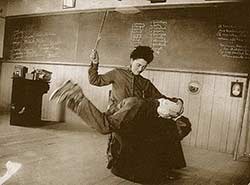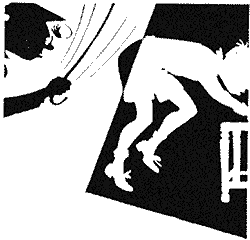|
Punishment in Schools
By David Wright
“School English” asks:
Tell us , please, about the system of corporal punishment which existed in Great Britain in the past.
 There were various systems of corporal punishment1 used in the distant past: those for adults and for children either at school or at home. The punishments which might be of most interest to School English readers are those which schoolchildren underwent, either at school or at home. It was often the case that a child who had misbehaved at school would be punished there and also at home when his or her parents found out2 about it.
There were various systems of corporal punishment1 used in the distant past: those for adults and for children either at school or at home. The punishments which might be of most interest to School English readers are those which schoolchildren underwent, either at school or at home. It was often the case that a child who had misbehaved at school would be punished there and also at home when his or her parents found out2 about it.
Not so long ago, common punishments which I remember (and received!) included caning3, either two strokes on the outstretched hand administered4 by the teacher in front of the class, or up to six strokes on the backside inflicted5 by the headmaster6. In Scotland, a leather strap was used instead of a thin bamboo cane.
Minor offences7 such as persistent8 talking in class might warrant9 a period of standing in a corner of the classroom, facing the walls, and subject to the ridicule10 of one’s classmates. Long ago, the child standing in the corner might be required to wear a conical hat with the word ‘DUNCE’11 written on it to increase the ridicule and emphasise his or her stupidity.
Some teachers favoured the giving of ‘lines’, that is to say, requiring one to write out by hand on paper (no computers then and no typing or carbon paper12 allowed!) repetitive lines of something relevant13 to the offence (as Bart Simpson does on the blackboard now). This might be something like “I must not talk in class” 50, 100, 300 or even 500 times. At the end of this, one’s hand ached and the lesson was learned – until next time! Most of us discovered that it was easier to write the words downwards in columns, thus, “I I I ... must must must ... not not not ... etc.” To thwart14 this strategy, the teacher might require the malefactor15 to copy a piece of prose, perhaps from Shakespeare, which meant paying much more attention to what one was writing.
 Another punishment was detention, a kind of imprisonment. In the junior school, this might simply be a matter of staying in the classroom during the playtime when all the other children could go outside; but in the more senior schools, it could mean staying back at school after everyone else had gone home in the evening. In my school, detentions were held for half an hour on Tuesdays and Thursdays, but if one accumulated three of these, a Saturday morning detention was substituted. This required three hours extra work on the day when one was normally free. Actually, the teachers didn’t like giving detentions any more than the students, because they meant that the teacher would have to stay behind to supervise as well, so it was a kind of punishment for them. It was even possible to bargain16 with some teachers and offer to accept a caning instead of a detention. Caning was only ever given to boys which we thought was grossly unfair – but that was in the days before the Women’s Liberation Movement took hold! Trivial misdemeanours17 might warrant a rap18 across the knuckles19 with a wooden ruler – that might not sound much, but two or three in the same place could leave a painful bruise20 and reinforce the lesson to be learned. Alternatively, a slap across the ear from a teacher who had crept up behind someone talking in class would be a reminder to pay more attention in future. In these ‘politically correct’ times, teachers have very few sanctions which they may exercise – certainly not any form of corporal punishment. A disciplined child or parent is likely to invoke EU Human Rights legislation21 if the teacher punishes a disobedient22 child and cause the teacher to be dismissed from his or her position.
Another punishment was detention, a kind of imprisonment. In the junior school, this might simply be a matter of staying in the classroom during the playtime when all the other children could go outside; but in the more senior schools, it could mean staying back at school after everyone else had gone home in the evening. In my school, detentions were held for half an hour on Tuesdays and Thursdays, but if one accumulated three of these, a Saturday morning detention was substituted. This required three hours extra work on the day when one was normally free. Actually, the teachers didn’t like giving detentions any more than the students, because they meant that the teacher would have to stay behind to supervise as well, so it was a kind of punishment for them. It was even possible to bargain16 with some teachers and offer to accept a caning instead of a detention. Caning was only ever given to boys which we thought was grossly unfair – but that was in the days before the Women’s Liberation Movement took hold! Trivial misdemeanours17 might warrant a rap18 across the knuckles19 with a wooden ruler – that might not sound much, but two or three in the same place could leave a painful bruise20 and reinforce the lesson to be learned. Alternatively, a slap across the ear from a teacher who had crept up behind someone talking in class would be a reminder to pay more attention in future. In these ‘politically correct’ times, teachers have very few sanctions which they may exercise – certainly not any form of corporal punishment. A disciplined child or parent is likely to invoke EU Human Rights legislation21 if the teacher punishes a disobedient22 child and cause the teacher to be dismissed from his or her position.
1corporal punishment – телесные наказания;
2find out – разузнавать, выяснять;
3caning – битье палкой;
4administer – (зд.) наносить (удар);
5inflict – наносить (удар);
6headmaster – директор школы;
7minor offence – незначительное нарушение;
8persistent – длительный, упорный;
9warrant – служить основанием;
10ridicule – осмеяние;
11dunce – болван, тупица;
12carbon paper – копировальная бумага;
13relevant – (зд.) относящийся;
14thwart – расстраивать, разрушать (планы и т. п.);
15malefactor – злоумышленник;
16bargain – заключать сделку;
17trivial misdemeanour – незначительный проступок;
18rap – легкий удар;
19knuckle – сустав пальца;
20bruise – синяк, ушиб;
21EU Human Rights legislation – декларация Европейского Союза о защите прав человека;
22disobedient – непослушный
Читать еще в этой рубрике:
Читать еще в этом номере:
|
|











